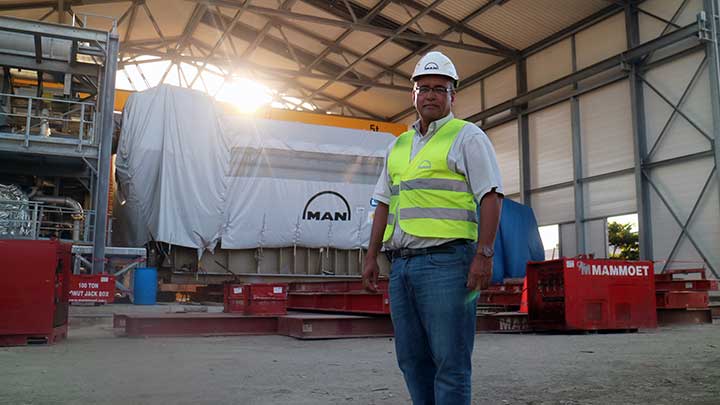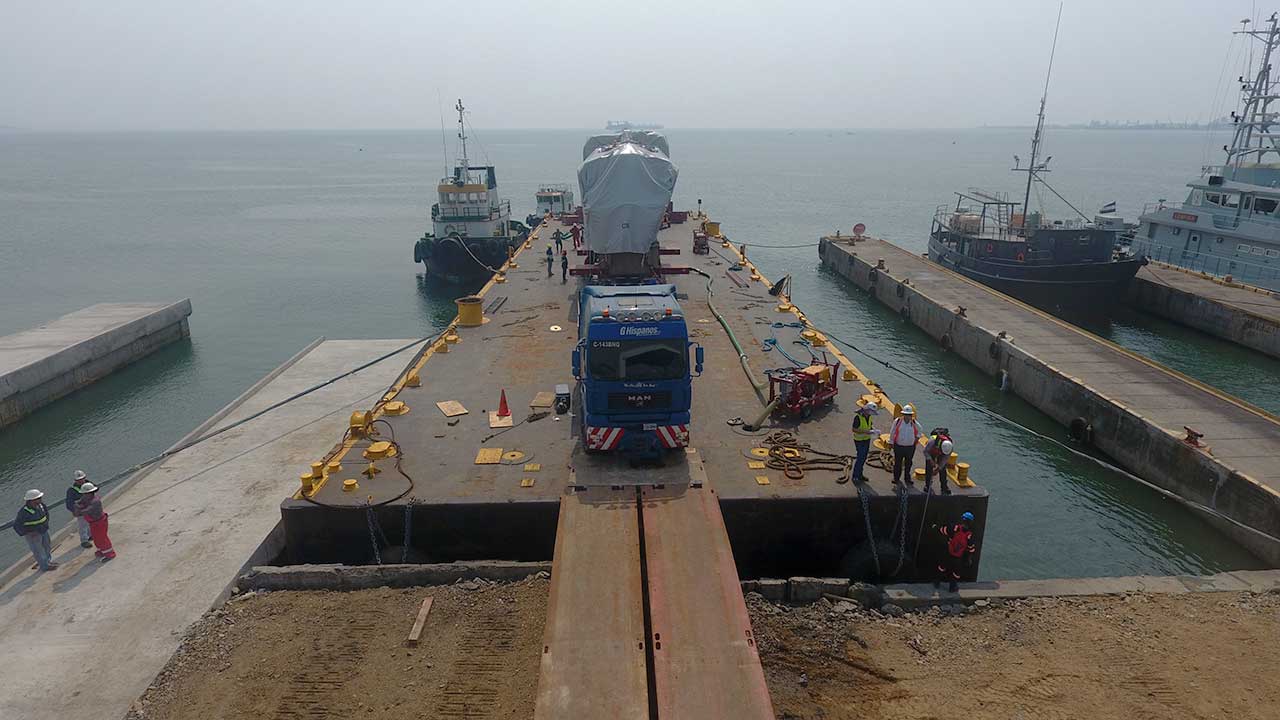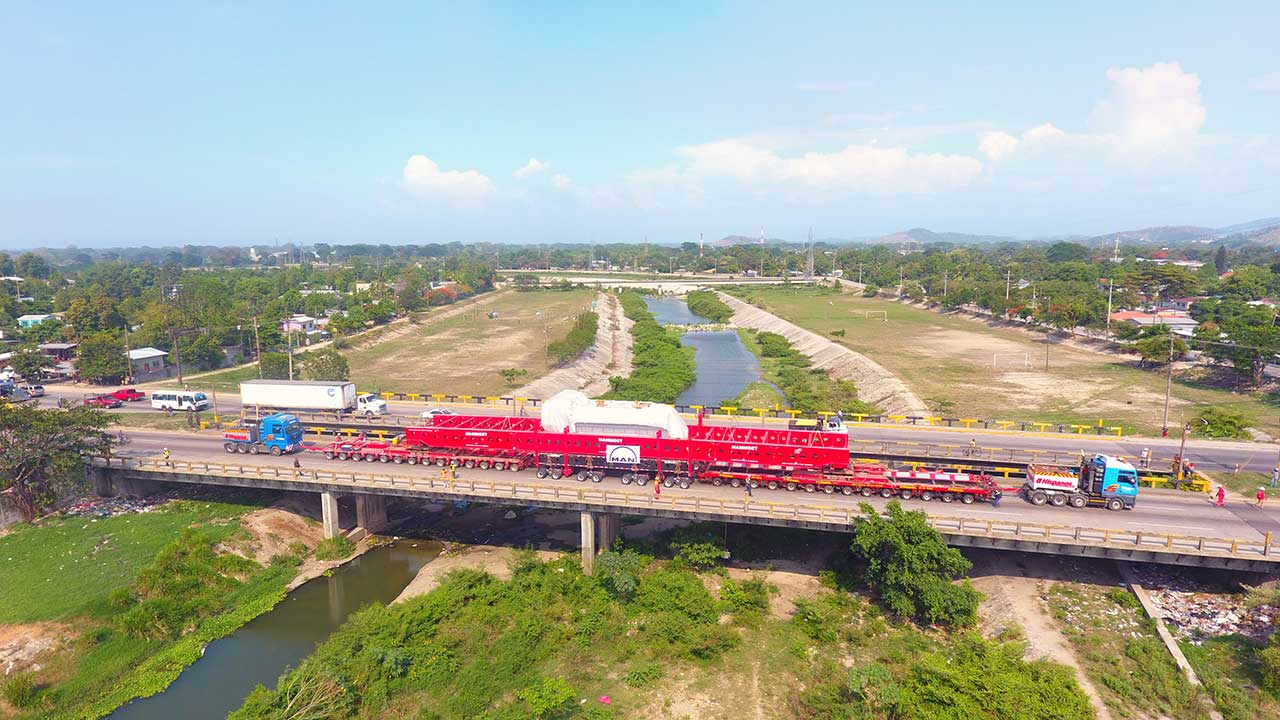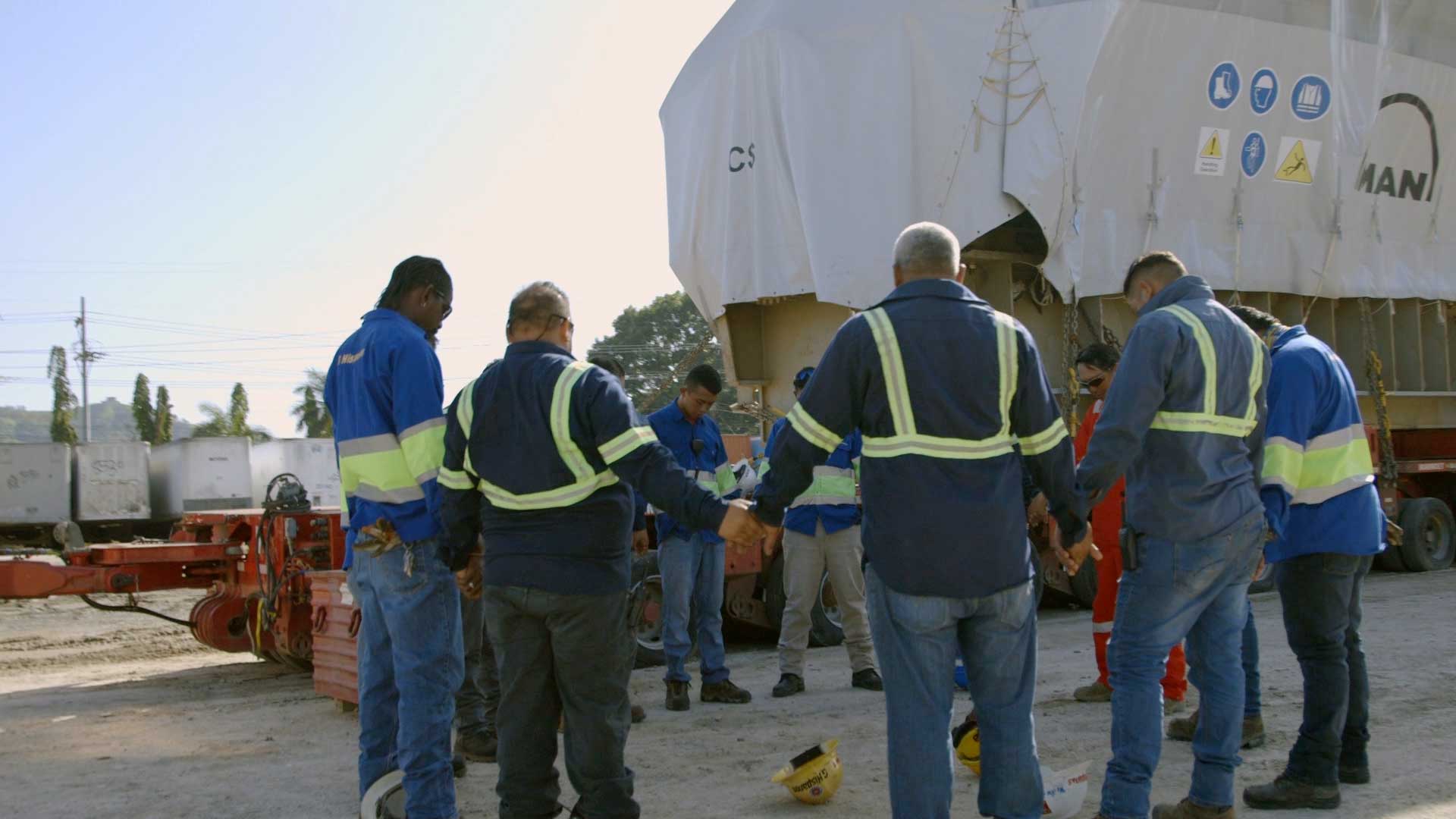The journey of three high efficient engines to Choloma to produce electricity and steam
This summer, after a wondrous journey through Honduras, three big MAN Energy Solutions engines reached the combined heat and power plant that ElcaTex is building in Choloma. The engines will double the sites' energy efficiency by producing not only energy but also steam.
by Jean-Cosme Delaloye
Ruth Madrid’s big brown eyes are filled with wonder. With her mother’s cellphone, the 13 year-old girl is filming the oversized convoy carrying the first of three massive MAN Energy Solutions 18V51/60 engines that will provide 54.8 Megawatt of power, as well as steam, to the ElcaTex textile plant behind her parents’ modest luncheonette in Choloma, Honduras. “It’s the first time I see something like this,” the schoolgirl says.
Javaid Siddiqi, MAN’s Choloma site manager, led the engines on an extraordinary two-month journey from the harbor town of Puerto Cortes, 40 kilometers away from Choloma. This morning in July, he is watching the convoy make one last sharp turn before it reaches the combined heat and power plant MAN Energy Solutions is building for Progressive Energy, the energy arm of ElcaTex. “It has been tense and challenging, because the infrastructure is not so strong here,” Siddiqi says. “It’s an accomplishment.”

Ruth Madrid filming the oversized convoy carrying a massive MAN Energy Solutions 18V51/60 engine that will provide 54.8 Megawatt of power to Ruths hometown in Honduras.
Highly-efficient engines produce both electricity and steam
Two months earlier, around 8pm on May 11, 2019: The evening brought some reprieve to the harbor of Puerto Cortes after an unforgivingly hot day. Now, the lights of the BBC Fuji cargo ship pierce the darkness that has fallen upon the harbor. The huge vessel is carrying precious cargo from Saint-Nazaire in France: the three 18V51/60 engines for the ElcaTex textile plant in Choloma, the epicenter of the booming Honduran textile industry.

Javaid Siddiqi, Site Manager, MAN Energy Solutions - Canada, in front of the 18V51/60 engine on foundation at the Progressive Energy Corporation plant.
Textile giant ElcaTex chose MAN Energy Solutions because it needed a partner capable of developing a highly-efficient solution to produce electricity as well as steam. “Steam is as important as power for textile manufacturing,” explains Leonel Nunez, the Choloma site manager for Progressive Energy. “These engines will allow us to increase our energy efficiency to 78% from 43% by producing steam, too. We will also be able to sell energy to the nearby industries. Each engine will produce 18 Megawatts of power.”
Moreover, the engines will offer Progressive Energy fuel flexibility. While at first they will operate on heavy fuel oil, Leonel Nuñez underscores Progressive Energy’s ambition to switch to natural gas once a reliable source of liquid natural gas can be secured.
The next morning, he and Javaid Siddiqi oversee the first complex maneuver of the transport. “The port cannot take the engines’ heavy load,” Siddiqi explains. “So we have to offload them onto a trailer on a barge and bring them to a naval base.”
When the crane slowly begins lifting up the 325-ton engine to transfer it to the barge stationed next to the BBC Fuji, the crew starts pumping water to the opposite side of the cargo ship to counterweight.
Dennis Varela, the captain of the boat that will pull the barge to the naval base, is watching from his ship’s deck how the engine is being placed on the trailer. “You have to deal with the tides and the winds,” Varela says. “It’s difficult, but that’s what I like.”
“Go!” A few minutes later, a male voice in Varela’s walkie-talkie gives him the signal to start moving. The captain cautiously pulls the lever. For the next 40 minutes, the engine sails through the majestic bay of Puerto Cortes to the naval base, where Javaid Siddiqi is expecting its arrival. The MAN site manager is well aware of another challenge awaiting the team: the clearance between the bottom of the barge and the seabed is tight and the room to maneuver is limited because of the weight of the engine. “We have very shallow waters,” Siddiqi says. “We have calculated everything, but every single centimeter matters.”
A band of brothers
As the sun is rising over Puerto Cortes the next morning, large crews from the international heavy lifting and transport specialist Mammoet and from the Honduran carrier Hispanos start the roll-off. Among the workers is Wilmer Serrano, Hispanos’ operations chief, who is driving the truck from the barge to the dock. “I am from Honduras, there are Brazilians, Guatemalans, Colombians, Americans, Germans,” Serrano says. “And we are working together like brothers to bring this engine to its destination.”
Wilmer Serrano drives the trailer off the barge very slowly and makes several stops to allow the crew to counterbalance the weight of the engine. “I feel very satisfied,” Siddiqi says after the successful completion of the hour-long roll-off operation. “But the challenges don’t end here. We now have to cross the Choloma Bridge, which cannot take the full weight of the engines, so we have to modify the trailer to distribute the load.”

The 18V51/60 engine crossing the old Choloma bridge on a specially-appointed girder frame trailer used to spread the huge load. The convoy moved at a speed of 3km per hour.
The engines reach the Choloma Bridge a month later, on June 20, 2019. “This would be a very difficult transport in any country, but even more so in Honduras,” explains Isabel Bascones, MAN Energy Solutions’ project manager. “We had to deal with heavy traffic and low-hanging power lines. We can only move at a pace of 3km/h.”
That morning, the crew has to lift part of an overpass so that the convoy can pass underneath before crossing the precarious bridge. “I’m proud,” Serrano says. “In our country, you don’t see loads like this being moved every day.”

Hispanos Group’s operations chief Wilmer Serrano (center) leading a prayer before the start of the final leg of the transport from Puerto Cortes to the Progressive Energy Corporation plant in Choloma.
“I am from Honduras, there are Brazilians, Guatemalans, Colombians, Americans, Germans. And we are working together like brothers to bring this engine to its destination.”
About the author
Jean-Cosme Delaloye is a journalist and documentary filmmaker with a focus on Central and South America.
Explore more topics
MAN Energy Solutions is now Everllence.
We have adopted a new brand name and moved to a new domain: www.everllence.com. This page will also be relocated there shortly. We are working on shifting all pages to www.everllence.com.
